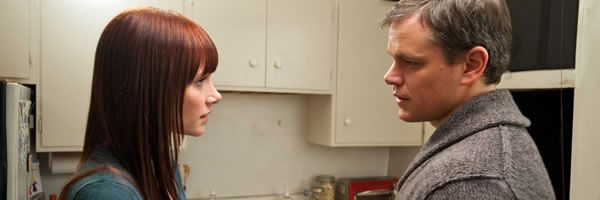One of the great unanswered metaphysical questions is "What happens to us after we die?" It's a question that can provoke rich, thoughtful, and emotional responses. As evidenced by Clint Eastwood's Hereafter, it can also provoke a response that's plodding, vapid, and distant. Rather than explore the notion of an afterlife through a strong, single narrative, Hereafter takes three unconnected and underdeveloped stories and then clumsily puts them together at the end as the lead characters attempt to come to grips with the great beyond. The story of a journalist (Cecile de France) coping with her own near-death experience lacks conflict and the tale about a twin (Frankie and George McLaren) dealing with the death of his brother is undone by a weak performance. The plotline about a psychic (Matt Damon) who feels cursed by his ability to communicate with the dead is the only story that feels like it could stand as its own movie, but it's underserved since it loses screen time to the weaker narratives.
The film begins with an impressive set piece that has a small village wiped out in tsunami. Popular French news anchor Marie LeLay (de France) is on vacation with her boyfriend/producer when she is swept up in the disaster and dies a little bit. She gets a glimpse of the hereafter, which is depicted in the movie as a bunch of blurry figures standing around. Marie's plotline is almost entirely devoid of conflict. She's fascinated by the concept of an afterlife and finds it difficult to concentrate on her job and burgeoning celebrity. But we never spend enough time with Marie to feel the impact of her near-death experience. Glimpsing the other side doesn't make her more vivacious or more frightened. It just changes her interests, which, as a viewer, isn't very interesting.
After Marie is resurrected, we move to George Lonegan (Damon), who has the ability to communicate with a person's dead loved ones. However, George views the ability as a curse and will only do readings after excessive prodding. During a cooking class, he meets Melanie (Bryce Dallas Howard) and the chemistry between the two actors is electric. Damon and Howard only have a few scenes together, but those scenes are the only time when it feels like the movie has a heartbeat. Their interplay is rich in humor, sadness, fear, and self-doubt. But even beyond their scenes, George has an interesting plotline. The "my-gift-is-a-curse" story isn't blazingly original, but in the context of people dealing with grief and the resolution (or lack thereof) that comes with speaking to the dead could have lead to a worthwhile story. Unfortunately, George has to share it with Melanie's conflict-free afterlife exploration and the film's third plotline.
The third story in Hereafter revolves around a young boy named Marcus grieving for the loss of his twin brother Jason (both roles are played by Frankie and George McLaren). Marcus and Jason's mother is a smack addict and they attempt to cover her habit from child protective services, but once Jason dies, it all falls apart and Marcus is sent to live in a foster home with perfectly nice people. However, he remains despondent, continuing to wear the hat that belonged to his deceased brother. Unable to let go, Marcus begins a search for someone that can reach into the beyond and speak to Jason.
The Marcus storyline, on paper, isn't bad, but McLaren's performance is. It looks like he was cast simply because he has a sad-looking face. Unfortunately, he can't deliver a line of dialogue to save his life. Every sentence he speaks sounds stilted and overly-rehearsed. It's as if McLaren heard the way people speak normally and did the exact opposite.
Hereafter really isn't about the afterlife but about grief. That's why Marie's storyline is pointless. She's out to talk about her experience with the afterlife, but it has no emotional pull on her. She just wants to prove it exists. But for a movie about grieving and the inability to say goodbye to our loved ones, Clint Eastwood has created a bland and thoughtless affair. It's ironic that a movie so lifeless should have such a poor understanding of the emotional impact of death.
Rating: C-

